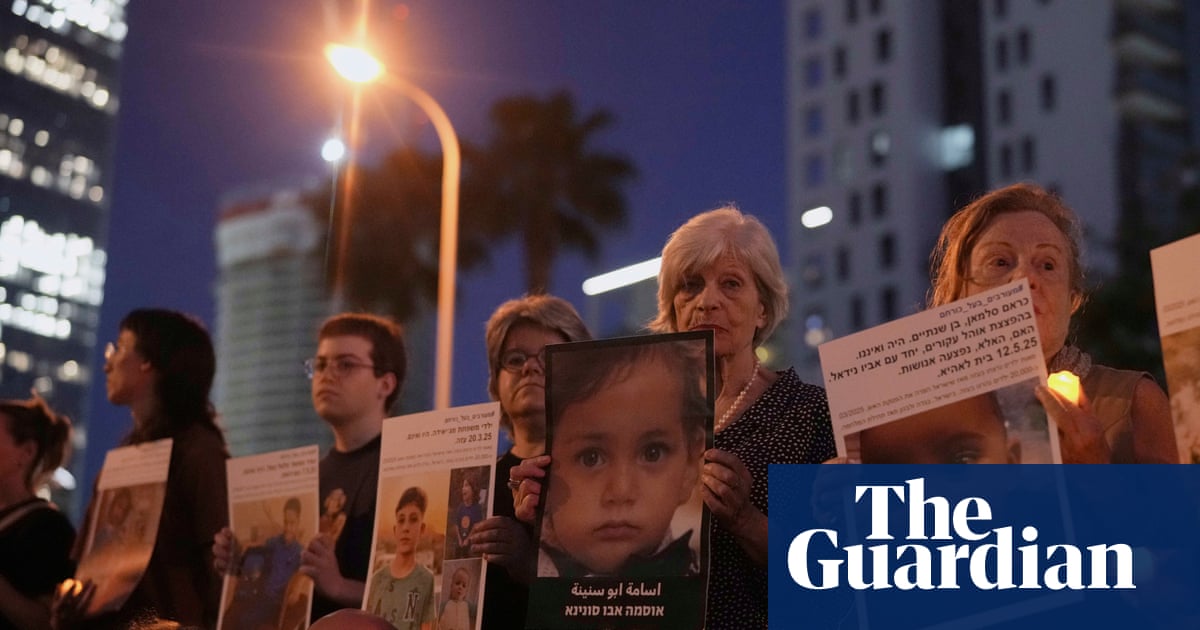For those of us in Israel who are horrified and ashamed about what our government is doing, we can only share Rhiannon Lucy Cosslett’s sense of hopelessness (As Gaza’s children are bombed and starved, we watch – powerless. What is it doing to us as a society?, 24 May).
For months now, as a member of the organisation Standing Together, an activist group of Jews and Palestinians, we have demonstrated to end the war. Lobbied politicians. Tried to awake the conscience of those who are only interested in territorial gain. Posted pictures of mutilated and starving Palestinian children. We cannot understand how the democratic world is so slow in responding. Many words of condemnation, but no action.
We the peacemakers are many, but our voice has no traction with this government. The Palestinian community dare not say a word as they know they will be picked up by the security forces, and demonstrators are faced with increasingly violent police under the ultra-right minister Itamar Ben‑Gvir. Films about the occupation are banned. Television does not show pictures fromGaza. We are sliding fast into the quagmire of fascism and our voices are being silenced.
Two countries for two peoples is what we want, and is the only way to peace. We have no Nelson Mandela here, or Martin Luther King, but we need every one of you to raise your voices and shout: “Enough.”Olivia BezalelClil, Israel
Rhiannon Lucy Cosslett’s piece questions what genocide, ethnic cleansing and forced starvation are doing to us, the privileged, in the UK. But she omits the very words for the events that the UK is purportedly “powerless” to stop. She laments her loss of faith in humanity. I sympathise. But she is not powerless. She is a journalist at one of the most prominent newspapers in the world.
Journalists can start by taking the most basic and obvious step of using the correct words. Use genocide to describe a genocide, use murder to describe murder, use ethnic cleansing to describe ethnic cleansing. And tell us, please, who is committing the acts that you feel such anguish about.
Powerlessness results from the inability to accurately describe what is happening, to condemn it and encourage readers to take action to stop it, such as protests, boycotts, or petitioning our government.Aymen KhouryLondon
I collect river stones. I paint them white, set up an art table at markets, at music venues and on the street at a weekly vigil in Maleny, in Jinibara country. I write the names of the murdered children and people come and paint them, talk about how they feel, say a prayer, have a cry, or just sit with the magnitude of it all. They take the stones home or leave them or gift them – most make a donation. The money goes toOlive Kids, an Australian-registered charity trying to provide for Palestinian children under near‑impossible circumstances.
I call them remembrance stones; a friend calls it “craftivism”. For me, it’s just the best idea I’ve got.Steven MoriartyDiamond Valley, Queensland, Australia
Rhiannon Lucy Cosslett’s words resonate deeply with me, and I imagine for millions of others around the world. I have sat with impotent rage at what is being done to defenceless people for more than a year and not knowing what to do with it. While one can blame Israel, what to say of the leaders of the “free world”, the western powers, who have enabled the starvation and destruction in Palestine?Arif PervaizEdmonton, Alberta, Canada
I am also a new mother and Rhiannon Lucy Cosslett has encapsulated how I am feeling absolutely perfectly. From wanting to skip traumatic videos online, yet feeling compelled to watch, to feeling a huge sense of sadness and guilt watching my vibrant, plump baby tucking into his big dinner, acutely aware that many in Gaza at this moment are starving and experiencing unimaginable trauma.
The feeling of powerlessness has affected me so much more during this particular humanitarian crisis than any other I can remember. Rhiannon may well be right that moral injury by proxy, while it is nothing compared with the trauma experienced by those in Gaza, might have long-term effects on people witnessing and absorbing so much trauma daily on their devices, but who know there is little they can actually do.Louise PostillPoole, Dorset
I am a paediatrician neonatologist. I have been working for six years in international cooperation programmes in Africa, even in unstable countries. Never before I have encountered such a deliberate targeting of health staff and children as I am seeing now in Gaza. If this is not a crime against humanity, I don’t know what else it could be.
We will be asked why we kept silent and I don’t want to keep silent. Where is the UN? Why can’t Britain, and European countries as a whole, do more to stop all of this? I wish I could join the doctors trying to save those children now, but it is impossible. Let me invite every reader to stand for those who have no voice and raise the cries of these children to our government.Anna BertiEnfield, London
Have an opinion on anything you’ve read in the Guardian today? Pleaseemailus your letter and it will be considered for publication in ourletterssection.
